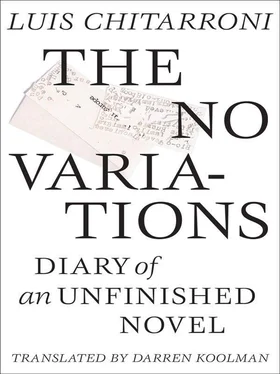The story he’d originally wanted to tell was about a single house, and he certainly tried writing it in the past, but his attempts and successes had always been greatly divergent, and this was chiefly on account of that impulsive nature. The story he now wanted to tell should have excluded all impulsiveness, or not (it didn’t really matter in the case of dictation, these documents acted only as spurs for his notebooks); he could keep it hidden in the background, in that empty mansion where spontaneous feeling takes refuge, and vapid, passionless words take their place on the page, battling it out like specters of slain soldiers. In this sense, the narrative mansion should be the opposite: there, the real forces would be acting , while successive proprietors and tenants, being subject to the passivity of the age — of any age, in fine — and poised on the threshold of an event, would have that freedom, that readiness that is so easily confused with aplomb, to respond to each daily challenge, each setback, in its proper manner, and with galling perfection. Critics and friends had already rebuked him for his honeyed volubility, and also that “nothing to say” which the terricolous Hardy suspected lay behind his ponderous, Tyrian diction. Critics and friends …, including one close friend, and one very distant critic, whose irreverence towards him snuffed out any possibility of friendship, for he accused him of the Pelagian heresy, after observing how little inclined he was to revision, lambasting his works for their serpentine, argentine oracy, and the author for his belief that they were “conceived without original sin.” Another deviant tendency to be discouraged, he tells himself while inspecting, beneath the ponderous drapes, the motes of dust Lydia herself had so stridently taken exception to, but whose presence he takes as evidence of her distracted state of mind that afternoon.
He decided he must resolve the matter sooner rather than later. He sat down to write: Wednesday afternoon he’d summon a coach and tell George, or even better, Burgess, that he’d be visiting Wharton or Agassiz. He would prefer that Miss Theodora Bosanquet absented herself, for she cultivated an annoying habit of interjecting on every serious discussion with dreamy sentimentalities: the poor woman. Then he’d proceed directly to Addison & Ibbetson’s office to consult the guide on contract waivers (taking for granted such a thing exists). After reading the various articles, he’d choose the most relevant, this being the one that suggests the most lenient way of terminating domestic service (supposing the archive had such a classification) in a house in the suburbs, roughly the same size as his. This last point should have been given the most attention, because the amount of redundancy is calculated according to how much work is done, on average, over the course of a period, and payment is then given both for the present period and the following one.
canNOt
Sounds NOthing like James. Reread those three short stories again, especially “The Next Time.”
I feel more assured by the incoherent babbling of a panhandler than by the apodictic pronouncements of philosophers.
Good Day, Sunshine
He considered that, if such a law existed (and he presumed one did, for his is not an unprecedented case), and allowing for a considerable margin of error, the amount allocated should vary in proportion to the number of tasks completed and the number that would have been completed, during the remainder of this period and the whole of the next, adjusting for age, the relative advantage and disadvantage of being made redundant when young, when mature, or when not far from that permanent redundancy of death, and all in accordance with the terms of the contract. The figures, however, did not matter. These can always be altered, and the amount extrapolated adjusted according to the arbitrary standard by which justice is usually dealt out. Insofar as the redundancy calculated at the expense of one’s dignity is proportionate to effort, he believed it to be just, and would pay that amount without scruple. The value of work not done, on the other hand, required of the employer an inordinate degree of generosity. Because the dismissal in this case was not unfair, it was a result of a conflict of interest. The scarcity of resources was the employer’s first defense, and those he had at his disposal, could be called to visibly attest to his humble way of life, and furthermore, they would illustrate the stark contrast between reality and mere show, which was the fashion of his age, an age when the condescending image of the real, the superficial, had been overthrown by something altogether alien and antagonistic, although he, being an artist, would have certainly reduced the issue to a contest of wills, hoping that, in the struggle, in his writings, he could produce a better substitute, someone more attentive, more benign, and less distracted than himself.
An outside intervention, please
It had begun raining so he left off writing. How much better he felt dictating on this occasion! In reality, the lives of the George and Lydia Smith of this world mattered more to him now than before — although their situation was, in reality, less hopeful — and he came to realize that, in all the time since making their acquaintance, he had scarcely learned anything about them … He should allow himself to recover. He did so tentatively, at first, even fearfully, as those people frequently do who have spent or misappropriated their store of passion — and he remembered, could have listed many a case — with obstinate greed, and afterwards, wheezing satiety.
They first came to Lamb House recommended by Lucien Sordido, a Corsican gentleman of Napoleonic stature who in bustling London, where word so quickly turns to gossip, was unable to prevent news spreading of his broken reputation. But Sordido certainly held him in high esteem, although it was the kind of esteem a man with an irreparably broken reputation bestows on one who is careless with his. Lucien Sordido had sent the couple to his home with a letter of introduction; it must still be in the notebook in which he was working at the time. He vowed to go looking for it, but not at that moment, since there was nothing in the contents he didn’t already know. During that first interview, he avoided interrogating them, for although he intended to improve, or at least not depreciate, the matrimonial economy, his sudden interest in them, after so many years of rebuffal, might have intimidated, or been interpreted by them as a prologue to a threat or a warning. But — taking into account the possible consequences, especially when fueled by a bottle of sherry — he wasn’t going to bring them to task for former actions they could not undo. His careful scrutiny of them, however, might have yielded answers to queries discretion prevented him asking: how much had redundancy affected them, and did it correspond to one of those pathetic destinies he had imagined? For not being content with ignorance, he transformed a mere presentiment of debility and destitution, of desperation and crisis, into an augury. His only duty was to be alert, should their conduct betray any subtle confirmation of it, or should their claims induce in him any impressions of incredulity.
Since then, having succeeded in restoring them to that previous state in which their livelihoods depended on a meager spring (one that delivers only on a monthly basis), he eases a vellication of remorse with the thought that they would be amply remunerated with freedom of time and leisure, although he knows the leisure of redundancy cannot truly be enjoyed. He could dissimulate that his reason for dismissing them was to allow them the opportunity to find better employment, but he could not deny that the pension afforded them but little subsistence, and encouraged too much idleness. Worse still, a cocktail of sherry and idleness could precipitate their ruin. They could of course argue that an everyday existence vitiated by poverty, fatigue, and disenchantment need not be altogether intolerable. They could very well relieve the sting of privation by beginning a regimen of more healthful distractions. If they manage to sustain it, he could call on the Smiths now and then to check on their progress, update his case study, in situ . And yet, he would still call on them, even if their regimen came to nothing. The one certainty is there will always be a story. And no matter how long or short, it would always be interesting, for the events in their lives continually rapt the attention of the curious. And curiosity should be considered, in the case of these rigorously factual stories, the means by which their factuality, their consistency, is proven: for curiosity questions every revelation, accepts nothing on trust.
Читать дальше












